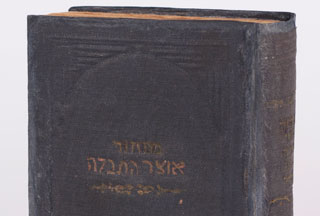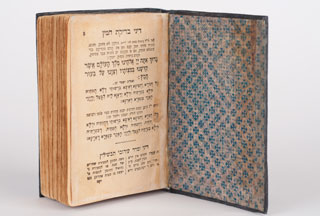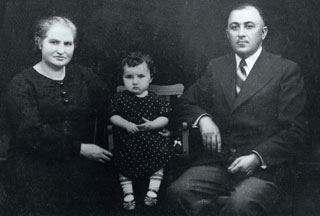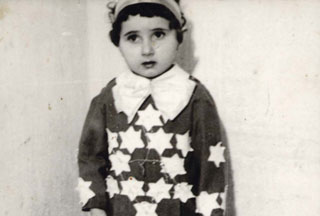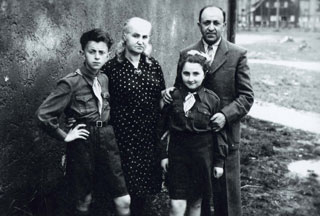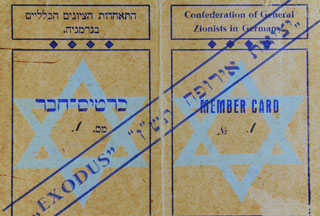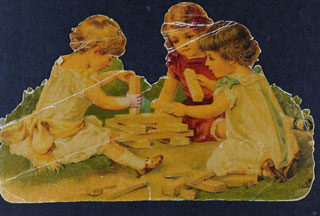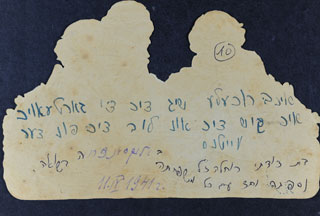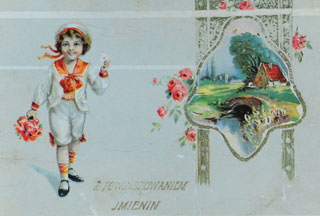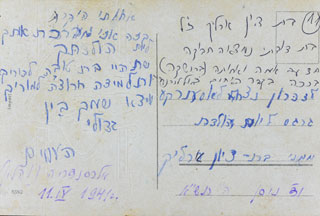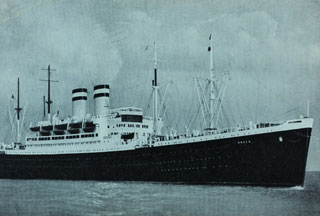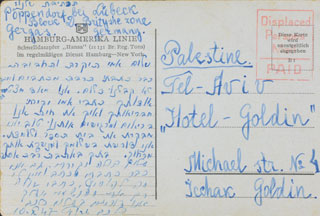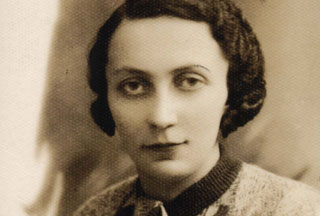A Prayerbook in Siberia
The Gergas (Geri) family took this Passover machzor (festival prayerbook) with them when they were expelled from Aleksandrja, Poland and sent to Siberia. It was one of the religious books that enabled them to observe Jewish laws and to learn Hebrew in the remote regions of Kazakhstan.
Shmuel and Bilhah and their children Chagai and Esther lived comfortably in Aleksandrja, Poland where they were partners in a wood supply business. The family were devoted Zionists who spoke Hebrew fluently. Shmuel served as the Jewish National Fund representative in the town.
In 1939 Aleksandrja came under Soviet control and the family were driven from their home. They moved in with Shmuel’s mother, Chava Gergas, but six months later on the 14th of April 1940 the Soviet commander in the town informed the entire Gergas family that they were being sent to Siberia on charges of Zionism and bourgeois behavior.
The notification came a week before Passover. The family had prepared matzah and had made preparations to celebrate Esther’s birthday that coincided with the holiday. Among the few items that Chava Gergas managed to collect together in the short time they had before their expulsion, was the freshly baked matzah they needed for the holiday and a few religious books including the Passover machzor.
After six weeks travel in freight cars the family reached the Sukhotin region of Kazakhstan. The Gergas family was the only Jewish family among the exiles that comprised the population of the village.
The Gergas family, like all the exiles, suffered from the acute lack of food and medicine. They survived by selling their belongings for basic products in order to survive. As time went on the family made a living by bartering items they obtained from different sources, among them from packages they received from relatives in Eretz Israel. Shmuel spent his days assisting the secretary of the Kholhoz by writing letters to the authorities.
Shmuel and Bilhah were determined to give their children an education with the meager means at their disposal. In the evenings Shmuel taught the children Hebrew using the religious books he brought with him as textbooks and Bilhah was in charge of the children’s mathematics lessons. Every day, Esther and Chagai were required to copy out the weekly Torah portion. The family tried to observe Jewish ritual and throughout their stay they refrained from eating meat, lit the Sabbath candles, celebrated Hanukkah and baked matzah for Passover.
The harsh conditions of cold and hunger didn’t spare the family. In the first year, Shmuel’s mother, Chava Gergas, died and two years later his sister Michla succumbed.
In 1942 Shmuel was sent to forced labor in the coal mine at Karganda, seven hundred kilometers from the village. The children remained with their mother and their uncle Nachum. In exchange for a coat and two nightdresses, Bilhah managed to buy a shack with a small plot of land where they were able to grow their own vegetables. Shmuel eventually returned home as the result of an accident in the mine that almost resulted in the loss of his finger.
The family remained in contact with the relatives that stayed in Aleksandrja until 1941 and they managed to receive greeting cards and a Jewish calendar for that year, but with the German occupation of Aleksandrja the connection was broken. At the end of 1944 Shmuel and Bilha wrote to the family but all they received was a laconic answer from the manager of the family’s factory who related that only ten Jewish children remained in Aleksandrja. He related that on Yom Kippur of 1942 all the Jews of the town’s ghetto were taken to the forest and shot, among them Bilhah’s sister and her daughters.
At the end of the war the Gergas family returned to Poland. They arrived at the town of Bilava where there was a United Nations DP camp. Shmuel was wary of the spread of disease in the camp and joined up with representatives of the Zionist movements. As a fluent Hebrew speaker he became a teacher in an educational institution in Bilava named for Henrietta Szold and was among those who was active in rescuing twenty-two Jewish children from monasteries in the area. As a result of this activity the staff of the institution and the Gergas family were forced to flee from the Polish authorities towards Germany. Assisted by representatives of the Haganah they crossed the borders of the Czech Republic and Austria wandering from one DP camp to another.
In 1947 Bilhah received permission to immigrate to Eretz Israel legally and with her she took the religious books that had accompanied the family throughout their exile.
Esther and Chagai stayed with Shmuel and along with the rest of the Henrietta Szold children. They traveled to Marseille where they joined the ship Exodus and sailed to Eretz Israel but the British forced the ship to return to Europe. In Hamburg the passengers were forcibly removed from the ship and sent in freight cars to the DP camp at Poppendorf. They arrived at Poppendorf with no basic necessities after the British authorities confiscated their knapsacks when the Exodus was seized.
Esther relates how the 29th of November 1947, the day of the UN decision on the declaration of the State of Israel, the authorities at Emden Camp to which they had been transferred, informed them over the public announcement system that there would be a state.
On hearing the announcement the children broke out in dancing. In December 1947 Esther, Chagai and ten other of the children were sent to Bergen Belsen DP camp, where their names were changed, they were attached to adult survivors disguised as their “parents”, and thus they arrived on the ship Transylvania on the 28th of November 1948 in Israel disguised as tourists on their way to Australia.
Armored cars took them to Binyamina and from there to Tel Aviv where their mother was waiting for them. Shmuel came to Israel separately via Egypt after the children. He joined the Haganah and served as a bookkeeper. Esther became a teacher. Chagai served as a lieutenant colonel in the standing army. Esther married Avraham Artzi and the couple have two children and four grandchildren. In January 2012, Esther donated the machzor and other religious books together with the correspondence with her cousins in Aleksandrja.
Yad Vashem Museum Artifacts collection, Gift of Esther (Gergas-Geri) Artzi


